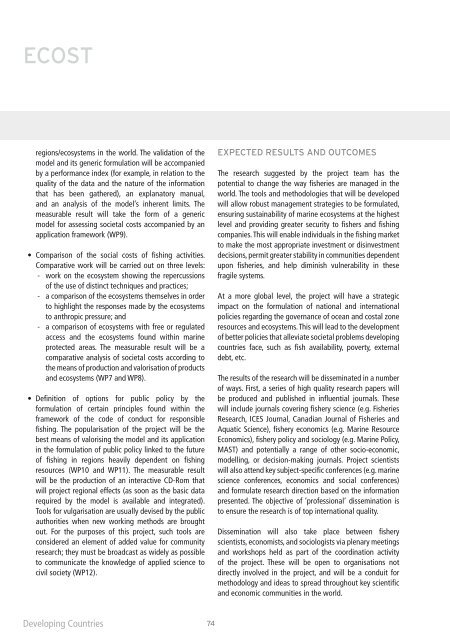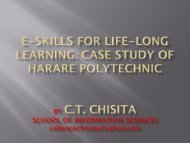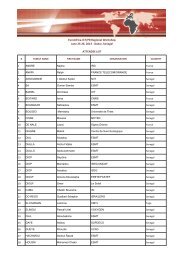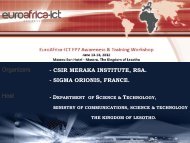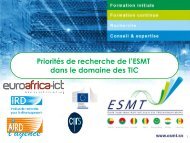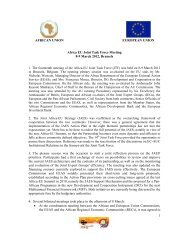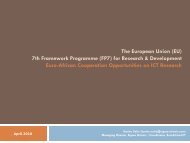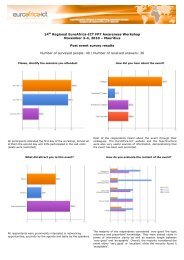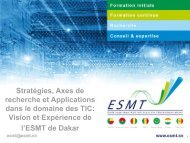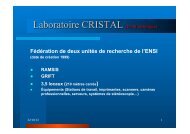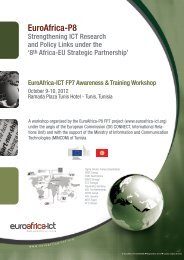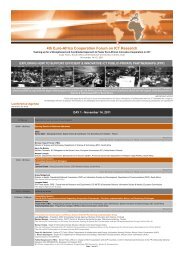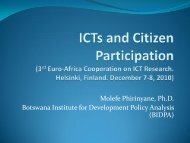part 1 - EuroAfrica-ICT
part 1 - EuroAfrica-ICT
part 1 - EuroAfrica-ICT
You also want an ePaper? Increase the reach of your titles
YUMPU automatically turns print PDFs into web optimized ePapers that Google loves.
egions/ecosystems in the world. The validation of themodel and its generic formulation will be accompaniedby a performance index (for example, in relation to thequality of the data and the nature of the informationthat has been gathered), an explanatory manual,and an analysis of the model’s inherent limits. Themeasurable result will take the form of a genericmodel for assessing societal costs accompanied by anapplication framework (WP9). Comparative work will be carried out on three levels:- work on the ecosystem showing the repercussionsof the use of distinct techniques and practices;- a comparison of the ecosystems themselves in orderto highlight the responses made by the ecosystemsto anthropic pressure; and- a comparison of ecosystems with free or regulatedaccess and the ecosystems found within marineprotected areas. The measurable result will be acomparative analysis of societal costs according tothe means of production and valorisation of productsand ecosystems (WP7 and WP8). formulation of certain principles found within theframework of the code of conduct for responsiblefishing. The popularisation of the project will be thebest means of valorising the model and its applicationin the formulation of public policy linked to the futureof fishing in regions heavily dependent on fishingresources (WP10 and WP11). The measurable resultwill be the production of an interactive CD-Rom thatwill project regional effects (as soon as the basic datarequired by the model is available and integrated).Tools for vulgarisation are usually devised by the publicauthorities when new working methods are broughtout. For the purposes of this project, such tools areconsidered an element of added value for communityresearch; they must be broadcast as widely as possibleto communicate the knowledge of applied science tocivil society (WP12).The research suggested by the project team has thepotential to change the way fisheries are managed in theworld. The tools and methodologies that will be developedwill allow robust management strategies to be formulated,ensuring sustainability of marine ecosystems at the highestlevel and providing greater security to fishers and fishingcompanies. This will enable individuals in the fishing marketto make the most appropriate investment or disinvestmentdecisions, permit greater stability in communities dependentupon fisheries, and help diminish vulnerability in thesefragile systems.At a more global level, the project will have a strategicimpact on the formulation of national and internationalpolicies regarding the governance of ocean and costal zoneresources and ecosystems. This will lead to the developmentof better policies that alleviate societal problems developingcountries face, such as fish availability, poverty, externaldebt, etc.The results of the research will be disseminated in a numberof ways. First, a series of high quality research papers willbe produced and published in influential journals. Thesewill include journals covering fishery science (e.g. FisheriesResearch, ICES Journal, Canadian Journal of Fisheries andAquatic Science), fishery economics (e.g. Marine ResourceEconomics), fishery policy and sociology (e.g. Marine Policy,MAST) and potentially a range of other socio-economic,modelling, or decision-making journals. Project scientistswill also attend key subject-specific conferences (e.g. marinescience conferences, economics and social conferences)and formulate research direction based on the informationpresented. The objective of ‘professional’ dissemination isto ensure the research is of top international quality.Dissemination will also take place between fisheryscientists, economists, and sociologists via plenary meetingsand workshops held as <strong>part</strong> of the coordination activityof the project. These will be open to organisations notdirectly involved in the project, and will be a conduit formethodology and ideas to spread throughout key scientificand economic communities in the world.Developing Countries


